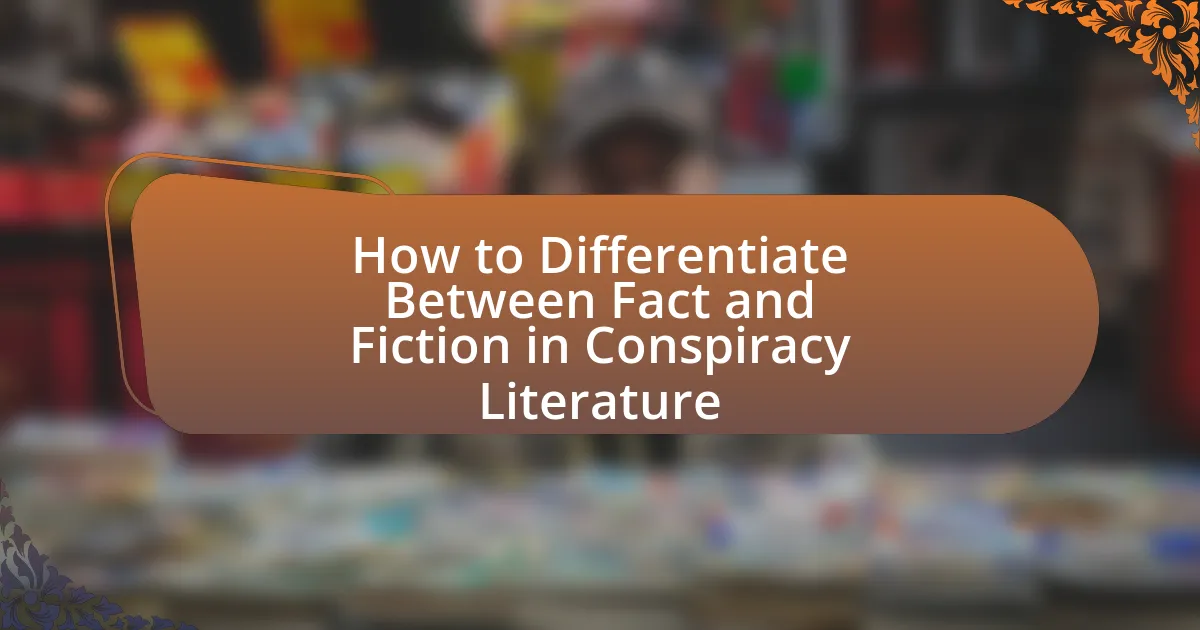Conspiracy literature encompasses written works that analyze or promote theories suggesting that events are manipulated by powerful groups. This genre is significant as it reflects societal anxieties and influences public perception, particularly during crises like the COVID-19 pandemic. The article explores the defining characteristics of conspiracy literature, the psychological and social factors driving its appeal, and the critical thinking skills necessary for readers to differentiate between fact and fiction. It emphasizes the importance of evaluating sources, verifying claims, and understanding the interplay of fact and fiction to navigate the complexities of conspiracy narratives effectively.
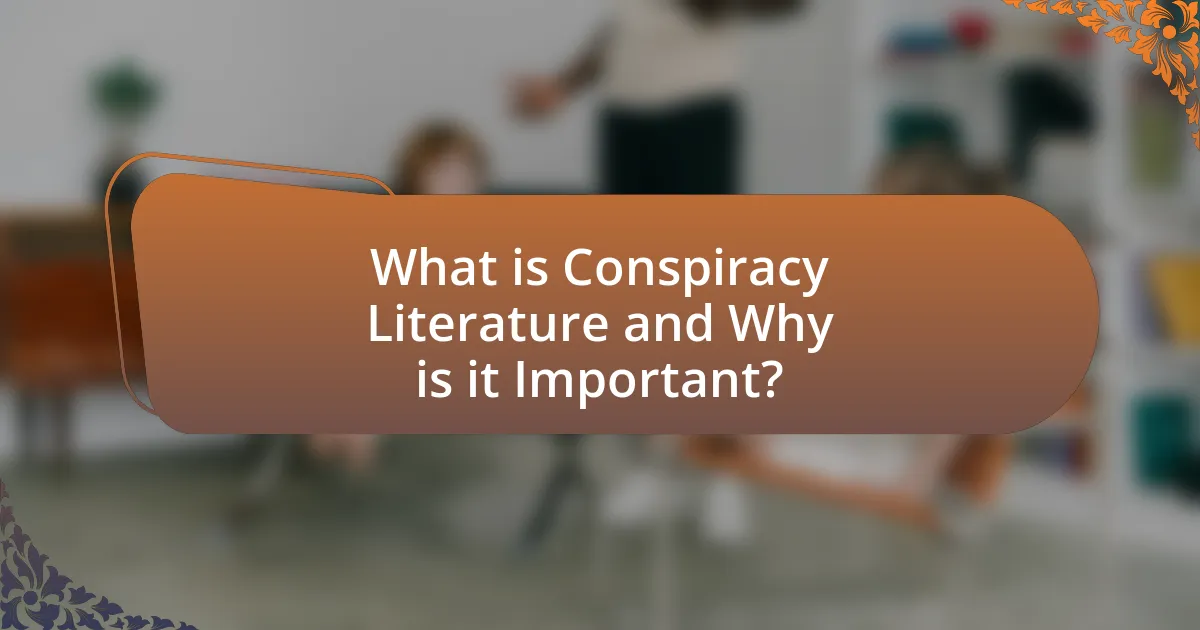
What is Conspiracy Literature and Why is it Important?
Conspiracy literature refers to written works that explore, analyze, or promote theories suggesting that events or situations are secretly manipulated by powerful groups or individuals. This genre is important because it reflects societal anxieties, influences public perception, and can shape political discourse. For instance, the proliferation of conspiracy theories during significant events, such as the COVID-19 pandemic, demonstrates how such literature can impact public health responses and trust in institutions. Understanding conspiracy literature is crucial for differentiating between fact and fiction, as it helps individuals critically evaluate the sources and motivations behind these narratives.
How does Conspiracy Literature differ from other genres?
Conspiracy literature differs from other genres primarily in its focus on secretive plots and hidden agendas, often involving powerful entities manipulating events behind the scenes. This genre typically emphasizes themes of distrust towards authority and the belief that mainstream narratives are misleading or false. Unlike traditional fiction, which may prioritize character development and plot progression, conspiracy literature often relies on real-world events and historical contexts to support its claims, creating a blend of fact and fiction that challenges readers to discern truth from fabrication. For example, works like “The Da Vinci Code” intertwine historical facts with fictional elements, prompting readers to question established narratives.
What are the defining characteristics of Conspiracy Literature?
Conspiracy literature is characterized by its focus on secretive plots, often involving powerful entities manipulating events for their own gain. This genre typically presents a narrative that challenges mainstream explanations, suggesting hidden motives behind widely accepted facts. Common elements include a reliance on anecdotal evidence, a distrust of official sources, and the portrayal of a small group of conspirators against a larger, unsuspecting public. Additionally, conspiracy literature often employs a sensational tone, creating a sense of urgency and fear to engage readers. These characteristics are evident in works like “The Protocols of the Elders of Zion,” which exemplifies the genre’s tendency to blend fact with fiction to promote a specific agenda.
Why do people gravitate towards Conspiracy Literature?
People gravitate towards conspiracy literature due to a combination of psychological, social, and cultural factors. This attraction often stems from a desire for understanding complex events and a need to find meaning in uncertainty, particularly during times of crisis or societal upheaval. Research indicates that individuals who feel a lack of control or experience anxiety are more likely to seek out conspiracy theories as a way to explain their circumstances. For instance, a study published in the journal “Personality and Individual Differences” found that people with higher levels of paranoia and lower trust in authority figures are more inclined to believe in conspiracy theories. This suggests that conspiracy literature provides a framework for individuals to make sense of their world, reinforcing their beliefs and offering a sense of community with like-minded individuals.
What role does Fact and Fiction play in Conspiracy Literature?
Fact and fiction play a crucial role in conspiracy literature by shaping narratives that blend real events with speculative elements. This blending often leads to the creation of compelling stories that resonate with readers’ beliefs and fears, making it difficult to discern truth from fabrication. For instance, conspiracy theories frequently utilize factual events, such as political scandals or historical incidents, as a foundation to construct elaborate narratives that may lack empirical support. This technique exploits cognitive biases, such as confirmation bias, where individuals favor information that aligns with their pre-existing beliefs, thereby reinforcing the appeal of the conspiracy. The interplay of fact and fiction in this genre not only captivates audiences but also raises critical questions about the nature of truth and the influence of misinformation in society.
How can readers identify factual elements in Conspiracy Literature?
Readers can identify factual elements in conspiracy literature by critically evaluating sources, verifying claims against credible evidence, and analyzing the context of the information presented. Critical evaluation involves checking the author’s credentials and the publication’s reputation, which helps establish reliability. Verifying claims against credible evidence includes cross-referencing with established facts from reputable sources, such as academic journals or government reports. Analyzing context requires understanding the broader narrative and motivations behind the conspiracy theory, which can reveal biases or manipulations in the information. For instance, a study published in the journal “Psychological Science” by Karen M. M. M. van Prooijen and others highlights that individuals often accept conspiracy theories when they lack trust in institutions, emphasizing the importance of skepticism and critical thinking in discerning fact from fiction.
What are common fictional elements found in Conspiracy Literature?
Common fictional elements found in conspiracy literature include secret societies, hidden agendas, unreliable narrators, and government cover-ups. Secret societies often serve as the driving force behind the conspiracies, suggesting that a powerful group manipulates events from the shadows. Hidden agendas create suspense by implying that characters have ulterior motives, while unreliable narrators challenge the reader’s perception of truth, making it difficult to discern fact from fiction. Government cover-ups frequently serve as a plot device, illustrating the lengths to which authorities will go to conceal the truth. These elements are prevalent in works such as “The Da Vinci Code” by Dan Brown, which incorporates secret societies and hidden agendas, reinforcing the genre’s characteristic themes.
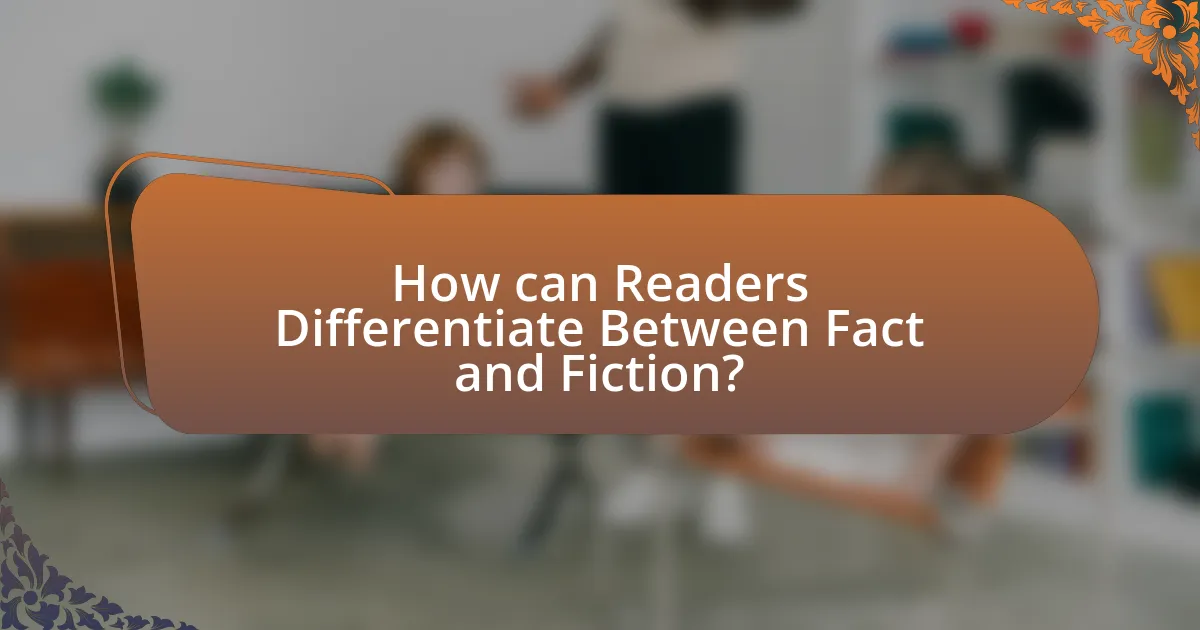
How can Readers Differentiate Between Fact and Fiction?
Readers can differentiate between fact and fiction by critically evaluating the sources of information and the evidence presented. Fact-based content typically relies on verifiable data, credible sources, and logical reasoning, while fiction often includes unverifiable claims, emotional appeals, and anecdotal evidence. For instance, reputable news articles cite studies, expert opinions, or official reports, whereas fictional narratives may lack citations or rely on sensationalism. By cross-referencing information with established facts and consulting multiple reliable sources, readers can discern the validity of the claims made in conspiracy literature.
What critical thinking skills are necessary for analyzing Conspiracy Literature?
Critical thinking skills necessary for analyzing conspiracy literature include skepticism, analytical reasoning, and the ability to evaluate sources. Skepticism allows individuals to question the validity of claims made in conspiracy literature, prompting them to seek evidence before accepting assertions as truth. Analytical reasoning enables the breakdown of complex arguments, facilitating the identification of logical fallacies or inconsistencies within the text. Evaluating sources involves assessing the credibility and reliability of the information presented, which is crucial in distinguishing between factual content and misinformation. These skills collectively empower readers to critically assess conspiracy literature and discern fact from fiction.
How can skepticism enhance the understanding of Conspiracy Literature?
Skepticism enhances the understanding of Conspiracy Literature by promoting critical analysis of claims and narratives presented within the texts. This critical approach encourages readers to question the validity of sources, examine the evidence provided, and differentiate between substantiated facts and unfounded theories. For instance, studies have shown that individuals who apply skepticism are more likely to identify logical fallacies and biases in conspiracy theories, leading to a more informed perspective on the material. By fostering a mindset that prioritizes evidence over speculation, skepticism serves as a vital tool in navigating the complexities of conspiracy literature.
What questions should readers ask when evaluating claims in Conspiracy Literature?
Readers should ask whether the claims in conspiracy literature are supported by credible evidence. Evaluating the source of the information is crucial; readers should consider the author’s qualifications and potential biases. Additionally, they should inquire if the claims are corroborated by independent sources or experts in the field. It is also important to assess the logical consistency of the arguments presented and whether alternative explanations have been adequately addressed. Finally, readers should question the motivations behind the claims and whether they align with established facts or scientific consensus.
What sources can help verify facts presented in Conspiracy Literature?
Reliable sources that can help verify facts presented in conspiracy literature include peer-reviewed academic journals, government publications, and reputable news organizations. Peer-reviewed journals, such as those found in databases like JSTOR or PubMed, provide rigorously vetted research that can confirm or refute claims made in conspiracy theories. Government publications, such as reports from the Centers for Disease Control and Prevention or the Federal Bureau of Investigation, offer official data and insights that can clarify misinformation. Reputable news organizations, like The New York Times or BBC News, adhere to journalistic standards and fact-checking protocols, making them valuable for cross-referencing claims. These sources collectively provide a foundation for distinguishing between fact and fiction in conspiracy literature.
How can reputable sources be identified?
Reputable sources can be identified by evaluating their credibility, authority, and reliability. Credibility is established through peer-reviewed publications, established academic institutions, or recognized organizations, which often provide verified information. Authority is determined by the author’s qualifications, expertise in the subject matter, and their affiliation with reputable institutions. Reliability is assessed by checking for citations, references, and the presence of supporting evidence in the source material. For instance, studies published in journals like Nature or The Lancet undergo rigorous peer review, ensuring the information is trustworthy.
What role do fact-checking websites play in this process?
Fact-checking websites play a crucial role in differentiating between fact and fiction in conspiracy literature by providing verified information and debunking false claims. These platforms analyze the accuracy of statements made in various media, including conspiracy theories, and present evidence-based conclusions. For instance, organizations like Snopes and FactCheck.org systematically investigate claims, often citing credible sources and research to support their findings. This process helps to educate the public, reduce misinformation, and promote critical thinking, thereby fostering a more informed society.
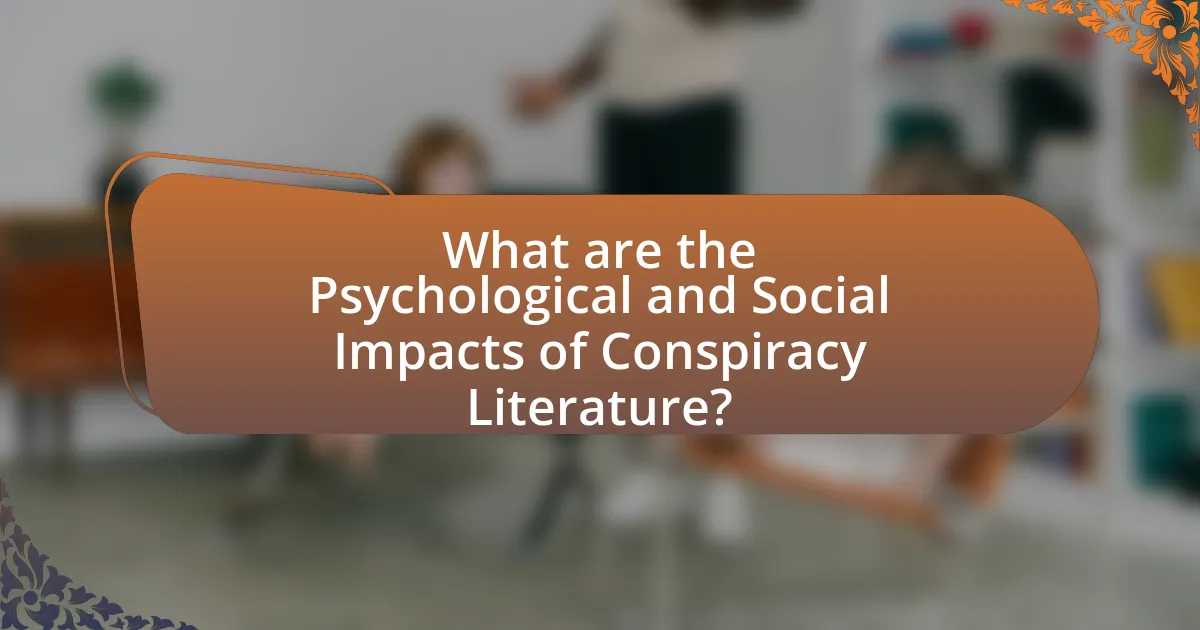
What are the Psychological and Social Impacts of Conspiracy Literature?
Conspiracy literature significantly influences psychological and social dynamics by fostering distrust and promoting paranoia among individuals and communities. This literature often leads to cognitive biases, such as confirmation bias, where individuals seek information that supports their pre-existing beliefs, thereby reinforcing their worldview. Research indicates that exposure to conspiracy theories can increase feelings of alienation and social isolation, as individuals may withdraw from mainstream narratives and communities that do not align with their beliefs. A study published in the journal “Personality and Individual Differences” by Karen M. M. M. van Prooijen and others found that belief in conspiracy theories correlates with lower levels of trust in institutions and higher levels of anxiety and uncertainty. This illustrates how conspiracy literature can create a feedback loop of distrust and social fragmentation, impacting both individual mental health and societal cohesion.
How does belief in conspiracy theories affect individuals?
Belief in conspiracy theories negatively affects individuals by fostering distrust in institutions and promoting social isolation. Research indicates that individuals who endorse conspiracy theories often exhibit heightened skepticism towards government, media, and scientific authorities, leading to a breakdown in social cohesion. For instance, a study published in the journal “Personality and Individual Differences” found that belief in conspiracy theories correlates with lower levels of trust in public health measures, which can hinder collective responses to crises such as pandemics. Additionally, individuals may experience increased anxiety and paranoia, as they perceive the world as more dangerous and deceptive than it is, further exacerbating feelings of isolation and alienation from their communities.
What psychological factors contribute to the acceptance of conspiracy theories?
Psychological factors contributing to the acceptance of conspiracy theories include cognitive biases, social identity, and a need for control. Cognitive biases, such as the proportionality bias, lead individuals to believe that significant events must have equally significant causes, making conspiracy explanations more appealing. Social identity influences acceptance, as individuals may align with groups that endorse conspiracy theories, reinforcing their beliefs through in-group validation. Additionally, a need for control and understanding in uncertain situations drives people to seek out conspiracy theories as they provide simple explanations for complex phenomena. Research by Goertzel (1994) found that individuals with higher levels of paranoia and lower trust in authorities are more likely to endorse conspiracy beliefs, supporting the link between psychological predispositions and conspiracy acceptance.
How can social dynamics influence belief in conspiracy theories?
Social dynamics significantly influence belief in conspiracy theories by shaping individuals’ perceptions and social interactions. Group identity and social networks can reinforce shared beliefs, as individuals often seek validation from peers, leading to an echo chamber effect where dissenting views are minimized. Research by Goertzel (1994) indicates that individuals with strong social ties to conspiracy believers are more likely to adopt similar beliefs, demonstrating the impact of social reinforcement. Additionally, social dynamics such as distrust in institutions and perceived social isolation can drive individuals toward conspiracy theories as a means of making sense of complex societal issues.
What strategies can help mitigate the spread of misinformation in Conspiracy Literature?
To mitigate the spread of misinformation in conspiracy literature, implementing fact-checking initiatives is essential. Fact-checking organizations, such as Snopes and FactCheck.org, actively verify claims made in conspiracy theories, providing accurate information to counter false narratives. Additionally, promoting media literacy education equips individuals with critical thinking skills necessary to evaluate sources and discern credible information from misleading content. Research indicates that individuals exposed to media literacy programs are better at identifying misinformation (Levine et al., 2020). Furthermore, fostering open dialogues about conspiracy theories in community settings can help individuals express concerns and receive factual responses, reducing the allure of misinformation. These strategies collectively contribute to a more informed public capable of distinguishing between fact and fiction in conspiracy literature.
How can education play a role in combating misinformation?
Education can play a crucial role in combating misinformation by equipping individuals with critical thinking skills and media literacy. These skills enable people to analyze sources, evaluate evidence, and discern credible information from false claims. Research indicates that educational programs focused on media literacy can significantly reduce susceptibility to misinformation; for instance, a study published in the Journal of Media Literacy Education found that students who received media literacy training were better at identifying misleading information compared to those who did not. By fostering an informed public, education serves as a foundational tool in the fight against the spread of misinformation.
What community initiatives can promote critical thinking about conspiracy theories?
Community initiatives that can promote critical thinking about conspiracy theories include educational workshops, public forums, and collaborative discussions. Educational workshops can provide participants with tools to analyze information critically, emphasizing skills such as fact-checking and logical reasoning. Public forums allow community members to engage in open dialogue, fostering an environment where diverse perspectives can be examined and questioned. Collaborative discussions, often facilitated by experts in psychology or media literacy, can help individuals understand the psychological appeal of conspiracy theories and the importance of evidence-based reasoning. Research indicates that programs focusing on media literacy significantly improve critical thinking skills, as shown in studies conducted by the Stanford History Education Group, which found that students who received media literacy training were better equipped to evaluate online information sources.
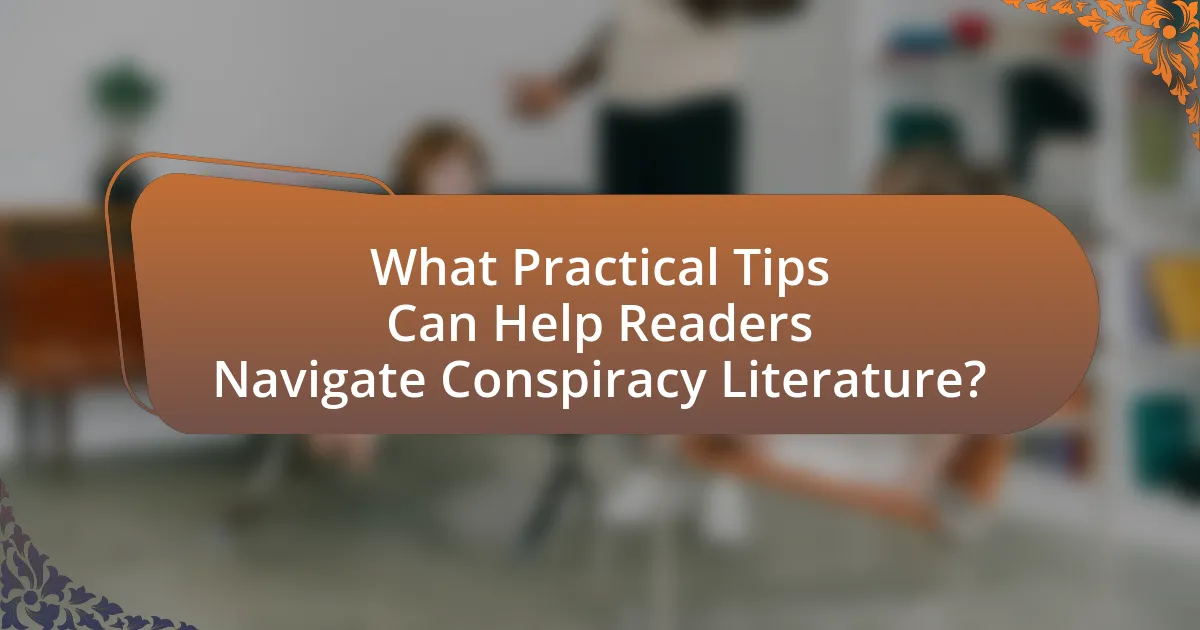
What Practical Tips Can Help Readers Navigate Conspiracy Literature?
To effectively navigate conspiracy literature, readers should critically evaluate sources, cross-check information, and seek out credible evidence. Critical evaluation involves assessing the author’s credentials, the publication’s reputation, and the presence of citations. Cross-checking information against reliable sources, such as academic journals or established news outlets, helps to verify claims. Seeking credible evidence includes looking for data, statistics, and peer-reviewed studies that support or refute the conspiracy claims. For instance, a study published in the journal “Psychological Science” highlights that individuals who engage in critical thinking are less likely to endorse conspiracy theories, reinforcing the importance of a skeptical approach.
How can readers develop a discerning approach to Conspiracy Literature?
Readers can develop a discerning approach to Conspiracy Literature by critically evaluating sources, cross-referencing information, and understanding the context of claims. Critical evaluation involves assessing the credibility of authors and the reliability of the publications, as many conspiracy theories originate from unverified or biased sources. Cross-referencing information with reputable sources, such as academic journals or established news outlets, helps to verify the accuracy of claims made in conspiracy literature. Additionally, understanding the historical and social context surrounding conspiracy theories can provide insight into their motivations and potential biases, allowing readers to distinguish between fact and fiction effectively.
What are effective methods for cross-referencing information?
Effective methods for cross-referencing information include verifying facts against multiple credible sources, utilizing databases and academic journals, and employing fact-checking websites. Verifying facts against multiple credible sources ensures that the information is consistent and reliable; for instance, if a claim appears in several reputable news outlets, it is more likely to be accurate. Utilizing databases and academic journals provides access to peer-reviewed research, which is essential for validating scientific or historical claims. Fact-checking websites, such as Snopes or FactCheck.org, offer assessments of popular claims and can clarify misinformation. These methods collectively enhance the accuracy of information, particularly in the context of distinguishing fact from fiction in conspiracy literature.
How can readers cultivate a habit of questioning sources?
Readers can cultivate a habit of questioning sources by actively evaluating the credibility and reliability of the information presented. This involves checking the author’s qualifications, examining the publication’s reputation, and cross-referencing facts with reputable sources. Research indicates that individuals who engage in critical thinking and source verification are less likely to fall for misinformation, as demonstrated by a study published in the journal “Science” which found that fact-checking significantly reduces the acceptance of false claims. By consistently applying these practices, readers can develop a more discerning approach to information consumption.
